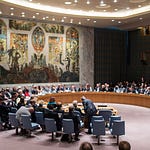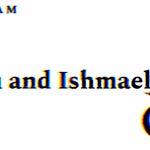Nat Turner’s rebellion in 1831 and Yahya Sinwar’s leadership, while separated by nearly two centuries and somewhat different contexts, are bound by a shared thread: resistance against what they perceived as oppressive forces. Turner, an enslaved Black man in the antebellum South, led one of the most notable slave revolts in American history. His insurrection was driven by the brutality of slavery, and while his actions—resulting in the deaths of many—were condemned at the time, he is now remembered by many as a martyr for the cause of freedom, an emblem of righteous defiance against an immoral system.
Yahya Sinwar, a leader of Hamas in Gaza, faced off against what he saw as colonial subjugation by Israel. Though the methods of Hamas, especially under Sinwar’s leadership, have been heavily criticized for targeting civilians, Sinwar himself was engaged in a struggle with deep-rooted political, religious, and historical dimensions. For his people, he stood as a symbol of resistance, fighting for a homeland against a much more powerful adversary.
Turner’s revolt was not bloodless, nor was it free from moral complexity. His rebellion led to the killing of innocents, but over time, history has reevaluated his legacy, often casting him as a freedom fighter whose violent methods were a reaction to the violence of slavery. Similarly, while Sinwar’s tactics are controversial and many view them as crossing ethical boundaries, his legacy will likely be shaped by how future generations understand the Zionist-Palestinian conflict. For many in Gaza and beyond, he may be remembered not primarily for the morality of his methods, but for his unyielding stance against occupation, much like Turner is remembered for his defiance of slavery.
As with Turner, Sinwar’s legacy will evolve as history progresses. Those who view their struggles through the lens of justice and liberation may ultimately find parallels in the narratives that surround these two men.
Nat Turner's rebellion in 1831, though rooted in a fight for freedom, was marked by extreme violence. The insurgents killed many, including women and children, and accounts from that time describe instances of rape and the beheading of babies. Turner’s rebellion was brutal, and many of its methods crossed moral lines, yet his legacy today is often framed in the context of fighting against the unspeakable horrors of slavery—a system of violence that itself dehumanized and brutalized millions.
In contrast, the claims about Hamas' actions on October 7th, 2023, during their attack on Israel, have included accusations of rapes and beheadings of babies (echoed then recanted by Biden.) These claims were widely reported but have been contested by reality itself. To date, no credible evidence has emerged to substantiate the specific accusations of baby beheadings or rapes by Hamas during the attack, though many civilians were killed in the conflict. While Hamas has been responsible for acts of violence and attacks on civilians, these particular allegations reflect the kinds of misinformation that often circulate in wartime.
Thus, the violence of Turner's revolt, which did see atrocities committed, contrasts sharply with the misinformation surrounding what Hamas allegedly did. While both Turner and Sinwar engaged in violent resistance, history will remember them differently. Turner, despite the brutality of his uprising, is now often honored as a symbol of defiance against a horrific system. Similarly, Sinwar’s legacy, though currently shaped by the controversial nature of Hamas’ actions, may be reassessed over time, especially as future generations evaluate Zionist expansionism.
Reassessed? Yes. In fact, to date there has been no true initial assessment of Yahya Sinwar's "slave revolt" because the Zionist State has deliberately obstructed UN investigations, preventing independent scrutiny of what occurred. Claims of atrocities committed by Hamas on October 7th, 2023, have gone unsubstantiated.
Sinwar’s political trajectory is complicated. He has long been a pawn in Israel's broader strategy of creating chaos and division among Palestinians. Israel, knowing Hamas' appeal to more radical and unsophisticated elements of Palestinian society—born from decades of brutal occupation, dispossession, and refugeehood—supported Sinwar in his rise to power to sideline the more internationally palatable Fatah. This was a calculated move: Israel understood that Hamas, lacking in cultural development and political finesse, would alienate Western sympathies. Sinwar, who was born in a refugee camp and lived the consequences of Israel's slow, genocidal policies—like the repeated bombings of Gaza euphemistically called “mowing the lawn”—fell into the trap of Netanyahu's machinations.
Netanyahu knew exactly what he was doing when he released Sinwar in a prisoner swap and tacitly supported Hamas’ dominance in Gaza. By fostering internal Palestinian division, Israel created absurd problems, only to then cry “Holocaust” to Western politicians they had long since bought off. Sinwar’s extremism, including the torture and killing of senior Hamas member Mahmoud Ishtiwi for being gay, is a direct result of the toxic environment Israel helped create. Hamas was actually far more moderate before Sinwar’s rise, which was effectively sponsored by Israel to counterbalance Fatah’s influence.
This meditation of mine is not a glorification of Sinwar or even of Nat Turner. Turner’s revolt was violent and crossed moral lines, and Sinwar’s leadership has certainly done the same. But walking in their shoes reveals the deeper manipulation at play: a colonial power like Israel, working to perpetuate divisions and incite violence for its own agenda. The events of October 7th, 2023, while tragic, were in many ways the predictable outcome of years of Israeli policies designed to push Palestinians into a corner, fueling frustrations and extremist responses.
In the end, the real culprits—Netanyahu and the Zionist establishment—are the lowest of the low, exploiting the suffering of the dispossessed to further their goals. Sinwar's legacy, for all its flaws, will ultimately be shaped by this manipulation, a leader trapped in the machinations of a far more sinister agenda. I didn't make a martyr of or empower Sinwar, Israel did, all so they could have a narrative and a boogeyman. But now the boogeyman man is dead (according to DNA reports), unable to face trial at The Hague alongside his sponsor Netanyahu, I can only imagine what further depths Zionists will plunge to for the sake of obtaining a new narrative and a new boogeyman. I've said from the start that gifting Sinwar & Netanyahu martyrdom wasn't justice, giving them a trial at The Hague with the possibility of lifetime confinement would have been justice. Instead, Sinwar gets to be symbol, unjustly vindicated by Zionist belligerence.











